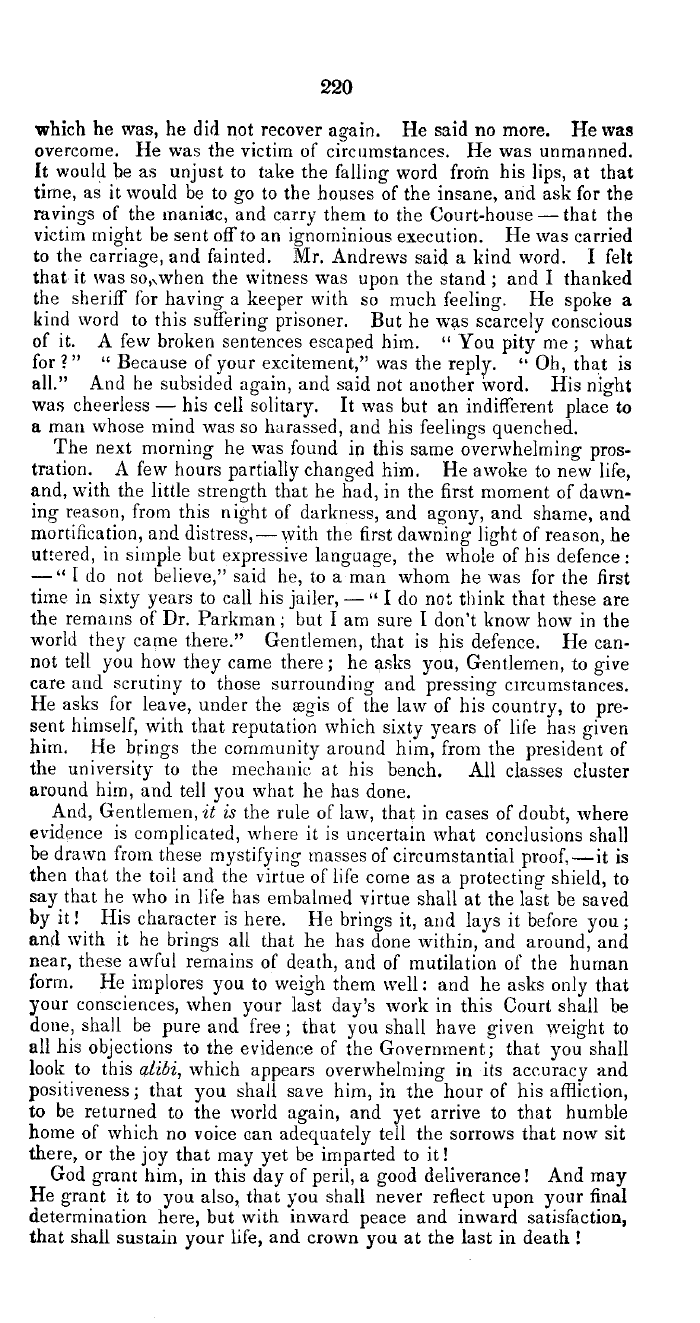|
220
which he was, he did not recover again. He said no more. He was
overcome. He was the victim of circumstances. He was unmanned.
It would be as unjust to take the falling word from his lips, at that
time, as it would be to go to the houses of the insane, and ask for the
ravings of the maniac, and carry them to the Court-house-that the
victim might be sent off to an ignominious execution. He was carried
to the carriage, and fainted. Mr. Andrews said a kind word. I felt
that it was so„when the witness was upon the stand ; and I thanked
the sheriff for having a keeper with so much feeling. He spoke a
kind word to this suffering prisoner. But he was scarcely conscious
of it. A few broken sentences escaped him. °' You pity me ; what
for ?" " Because of your excitement," was the reply. " Oh, that is
all." And he subsided again, and said not another word. His night
was cheerless - his cell solitary. It was but an indifferent place to
a man whose mind was so harassed, and his feelings quenched.
The next morning he was found in this same overwhelming pros.
tration. A few hours partially changed him. He awoke to new life,
and, with the little strength that he had, in the first moment of dawn-
ing reason, from this night of darkness, and agony, and shame, and
mortification, and distress,-with the first dawning light of reason, he
uttered, in simple but expressive language, the whole of his defence:
-" I do not believe," said he, to a man whom he was for the first
time. in sixty years to call his jailer, - 1° I do not think that these are
the remains of Dr. Parkman ; but I am sure I don't know how in the
world they came there." Gentlemen, that is his defence. He can-
not tell you how they came there; he asks you, Gentlemen, to give
care and scrutiny to those surrounding and pressing circumstances.
He asks for leave, under the Tgis of the law of his country, to pre-
sent himself, with that reputation which sixty years of life has giver.
him. He brings the community around him, from the president of
the university to the mechanic; at his bench. All classes cluster
around him, and tell you what he has done.
And, Gentlemen, it is the rule of law, that in cases of doubt, where
evidence is complicated, where it is uncertain what conclusions shall
be drawn from these mystifying masses of circumstantial proof,-it is
then that the toil and the virtue of life come as a protecting shield, to
say that he who in life has embalmed virtue shall at the last be saved
by it! His character is here. He brings it, and lays it before you;
and with it he brings all that he has done within, and around, and
near, these awful remains of death, and of mutilation of the human
form. He implores you to weigh them well: and he asks only that
your consciences, when your last day's work in this Court shall be
done, shall be pure and free ; that you shall have given weight to
all his objections to the evidence of the Government; that you shall
look to this alibi, which appears overwhelming in its accuracy and
positiveness; that you shall save him, in the hour of his affliction,
to be returned to the world again, and yet arrive to that humble
home of which no voice can adequately tell the sorrows that now sit
there, or the joy that may yet be imparted to it!
God grant him, in this day of peril, a good deliverance! And may
He grant it to you also, that you shall never reflect upon your final
determination here, but with inward peace and inward satisfaction,
that shall sustain your life, and crown you at the last in death !
|

